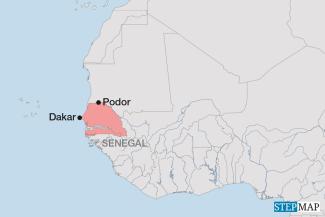National cuisine
Every guest is welcome at the dinner table in Podor

The guests from Germany have had an almost eleven-hour car journey from Dakar to Podor. The roads are busy and narrow, and the trip normally takes around seven hours. But this time, the car provided by the hostess’s niece broke down. When the group finally arrives, everyone is very hungry.
The visitors gather on the open first-floor terrace of the house on the outskirts of town. A hot desert wind is blowing. Even in the late afternoon, it provides little cooling relief. The temperature stays above 30°C. Everyone sits on mats on the floor in a circle. Stomachs rumble. Then a member of the family brings in a large round lidded silver tray. The atmosphere is electric – what might there be to eat? The tray is placed in the centre of the circle and the lid is removed: thiéboudienne, Senegal’s national dish. In the local Wolof language, it is called ceebu jen: ceebu means “rice with” and jen means “fish”.
The base is a bed of spiced, seasoned rice and is topped in the centre with fried or dried fish and a variety of cooked vegetables such as cabbage, aubergine, okra, pumpkin, carrot, sweet potato or yam. Each guest is given a spoon and eats from his or her own segment of the large tray. A spicy green paste made from hibiscus leaves and a dark tamarind sauce are served as accompaniments and used according to taste. The Senegalese hostess eats African-style, with her right hand, forming rice, fish and vegetables into bite-sized balls. She also distributes even helpings of fish and vegetables to each guest. The food is spicy and very tasty.
Fish bones or tamarind stones from the sauce can simply be placed on the floor next to the tray. Before the meal, a large washable cover was spread over the seating mat. It can later be removed and cleaned – very practical.
The meals that follow are served in a similar way. Rice or couscous is spread over the large serving tray and topped in the centre with vegetables, fish or meat. Senegal is a Muslim country, so no pork is eaten, but chicken, beef and mutton are very popular. Most animals in Podor lead a happy life before they end up in the cooking pot. Fish come straight from the Senegal River, which flows through the town. During the day, goats and sheep are allowed to range freely and roam the streets. In the evening, they return to their homes on their own, the locals explain.
For German visitors, breakfast takes some getting used to. Fresh baguettes from the local baker are served with the leftovers from the previous day’s evening meal. Coffee is rarely drunk. Green tea – very strong and sweet – is the beverage of choice in Senegal.
When guests from Germany arrive, family and friends come to visit in large numbers. Anyone who wishes to stay for dinner is very welcome. The large dining trays are always fully laden, and diners simply move closer together if more guests arrive. No one goes home hungry.
Of course, there is a lot of unseen logistics behind the scenes, the hostess explains. Her sister and other relatives spend several hours a day cooking kilos of rice, vegetables, fish and meat. But the guests see little sign of that. For practical reasons, the cooking is done in another house nearby.
The difference between tourist catering and home cooking becomes very clear to guests when they visit the capital Dakar. Traditional dishes such as thiéboudienne can also be ordered there but they are served on a separate plate for each guest.
Sabine Balk works as a freelancer for D+C/E+Z. She was on a private visit to Senegal.
euz.editor@dandc.eu







